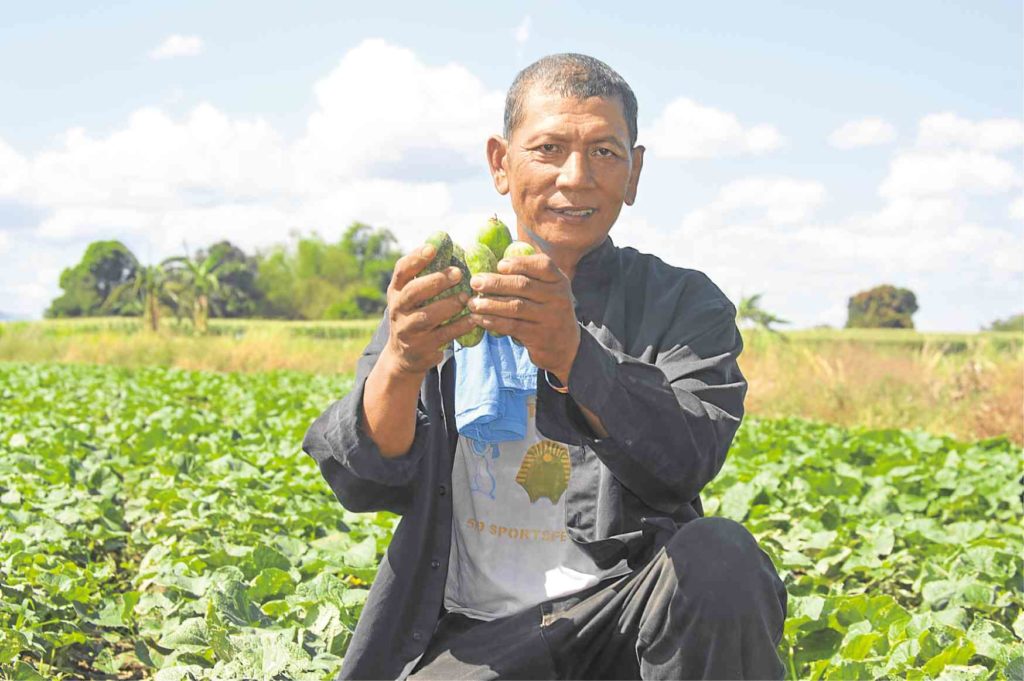
Farmer Victoriano Dingle displays gherkin cucumbers freshly harvested from his farm in Barangay Macapsing at Rizal town in Nueva Ecija
RIZAL, NUEVA ECIJA—For years, 53-year-old Victoriano Dingle, a farmer, had planted onions as soon as he harvested palay from his 1-hectare farm in Macapsing village here.
This farming pattern worked well for years, said Dingle, until the effects of climate change and the frequency of armyworm attacks cost him huge losses in crops and income.
“At times, I would break even; other times I couldn’t recoup my expenses,” he said.
Then he decided to plant Gherkin cucumbers, and said his “life had never been better than now.”
Gherkins are small cucumbers (Cucumis sativus) that could be harvested after 35 days.
Dingle is among 11 families engaged in Gherkin production here, and 80 others in the nearby town of Bongabon.
“The income may not be as high as onions when there is good production, but it is a sure thing. Plus, you have a ready market for it,” Dingle said on April 26 when he and about 90 other farmers undertook their first Gherkin harvests here.
Each year, Unilever Philippines needs about 1.2 million metric tons of Gherkin cucumbers to make these into bottled pickles. Collaborating with Sunrich Corp., Unilever has partnered with the 91 farming families.
Unilever gets Gherkin cucumbers processed by Sunrich, according to Francisco Vicente Garcia, assistant to the Sunrich president. It operates a curing facility in Tarlac and a processing plant in Calamba, Laguna.
“We also supply seeds to the farmers,” Garcia said.
For a hectare of farm, food producers require 30 packs of the Puccini variety. Each pack costs P655.
Unilever, on the other hand, guides Sunrich and helps farmers subscribe to its food quality protocol, the Sustainable Agricultural Code.
“This code outlines 11 indicators, like land use, crop management for high yield and nutritional quality, pest control, soil management, biodiversity, the use of renewable sources, safety and even social conditions,” said Rondell Torres, Unilever’s senior manager for sustainable business.
Sustainability is at the heart of Unilever Philippines’ business, according to Kristine Go, Unilever marketing director for foods.
“Sourcing [raw material from] local farmers ensures a supply of quality ingredients for our Lady’s Choice brand. This creates only the best and most delicious products possible while creating sustainable growth for the community and farming industry,” Go said.
Introducing Gherkin production to Nueva Ecija makes the company’s supply chain more inclusive to local farmers, said Ed Sunico, Unilever vice president for sustainable business and communications.
As the yield increases and more farmers are enticed to grow the cash crop, Unilever may also export Gherkin cucumbers, Sunico said.
Ramon Palomo, a farmer from Guimba, demonstrated cucumber farming last year to prove the cucumbers’ profitability.
“They liked it because the crop did not require elaborate land preparation and cucumbers require only four bags of urea and complete fertilizer infusion per hectare,” Palomo said.
The average yield, he said, was 15 tons of cucumber a hectare.
But harvest volumes can still go higher as crop techniques are mastered, he said.
The farm gate price for pickled cucumbers (with a maximum diameter of 33 millimeters) is P7 a kilogram.
Cucumbers rejected for pickling are sold for P4 a kg.
“The harvesters and the haulers are from the surrounding communities. They are paid on a per-day-basis,” Palomo said.
As such, practically the entire community benefits from the cucumbers.

